What is a Link Exchange and Will it Improve SEO?
Sep 14, 2023
Written by Andrew Sperl

As Vice President and a Partner at Vazoola, Andrew has his hands in all aspects of the business from sales to marketing to employee development and much more. He has passion for all aspects of building and growing a business, and has devoted himself to becoming an expert on off-page SEO.
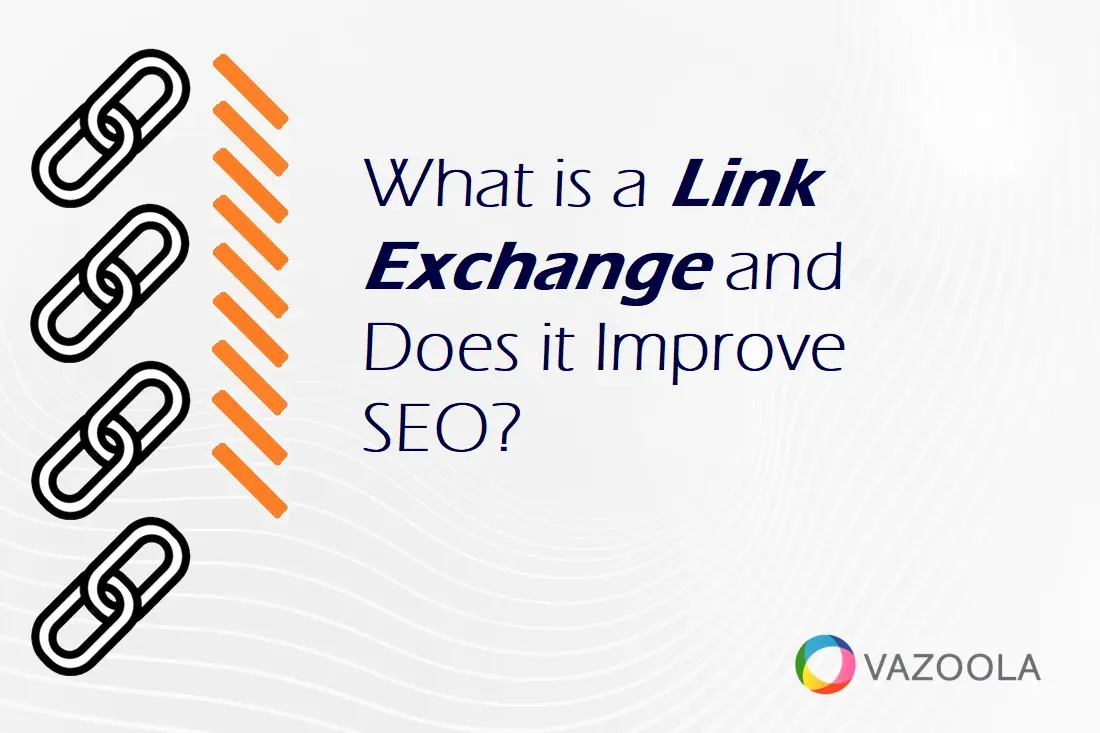
Here at Vazoola, we take a balanced approach to the ever-evolving topic of the link exchange.
While the strategy doesn't usually headline our recommended plans for clients, we can't overlook its prevalent existence in the SEO landscape.
In fact, a recent AuthorityHacker survey found that link-building professionals turn to exchanges more commonly than any other tactic save the ever-effective guest post.
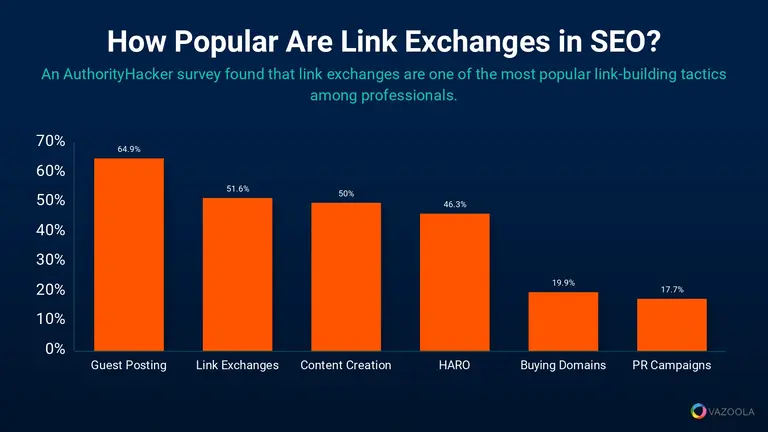
Exchanging links is a practice that's as old as SEO itself, and even Google—the behemoth arbiter of all things search—has put forth guidelines acknowledging the SEO link exchange as a natural part of the digital ecosystem.
In this comprehensive article, we'll not only unpack Google's official stance but also explore various types of link exchange, their potential advantages, and the pitfalls you might want to avoid.
Intrigued? You should be. By the time you finish reading, you'll possess enough knowledge to make informed decisions about reciprocal link building efforts, aligning them with your broader SEO initiatives.
Key Takeaways:
-
Known by various terms such as link swaps and reciprocal links, cross linking involves mutual linking between two websites. However, making reciprocal links the sole focus of an SEO strategy is not advisable.
-
Multiple forms of link exchange, including reciprocal links, ABC exchanges, guest post swaps, and organic exchanges, offer distinct advantages and serve unique purposes.
-
Google does not automatically penalize a link exchange, but its guidelines discourage many practices used when exchanging links.
-
Misuse of links can negatively impact your SEO efforts, especially when involving an irrelevant or low-quality site, or when swapping links makes up too large a portion of your linking profile.
-
When conducted thoughtfully, a link exchange can provide numerous benefits, such as increased site authority and relevance, as long as they align with certain criteria like site quality, relevance, and user value.
-
Acquiring reciprocal links is not a matter of luck but involves a well-planned strategy that may include outreach, linking out freely, crafting high-quality content, or employing link-building services.
Table of Contents
What is Link Exchange in SEO?
Link exchanges, often referred to as link swaps, reciprocal links, or mutual links, remain a stalwart in the ever-changing field of SEO.
In this straightforward yet significant practice, two website owners agree to link to each other's sites. The primary goal often is enhancing search engine rankings and bolstering referral traffic.
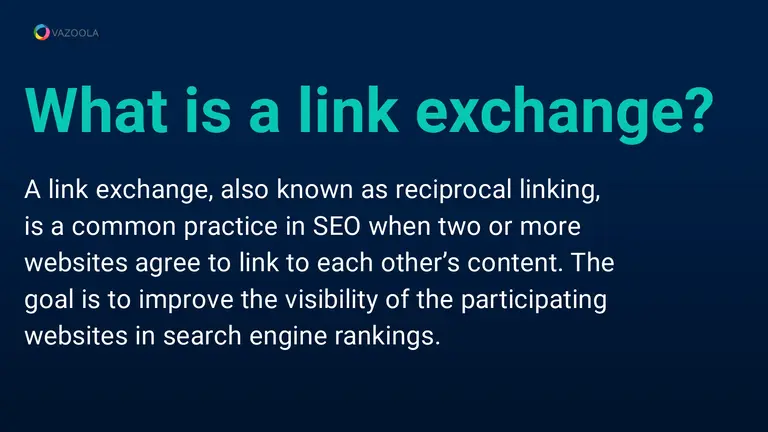
Over the years, the practice of reciprocal linking across multiple sites has gained considerable traction, becoming an almost routine aspect of many SEO portfolios.
However, a word to the wise: While reciprocal linking can complement a multifaceted SEO strategy, placing excessive reliance on this technique alone is ill-advised.
Relying on a link exchange is akin to building a house solely out of bricks; yes, they are sturdy, but you'll need more than just bricks to create a robust, resilient structure.
Similarly, a diversified backlink strategy often yields the most durable, sustainable results. Therefore, consider the link exchange as one tool in a broader SEO toolbox rather than as the linchpin of your entire online presence.
Pro Tips:
Securing links from a diverse range of domains lends more credibility to your website in search engine results than multiple links from a single domain. Search engines view this diversity as a sign that multiple sources find your content valuable, thereby increasing your site authority.
Types of Backlink Exchanges
Generally speaking, exploring exchanging links uncovers a variety of types, each with its unique characteristics and benefits. Before embarking on any link exchange venture, understanding these variations can prove invaluable.
Recognizing the various types of link exchange arms you with the necessary knowledge to choose the most suitable method for your particular needs.
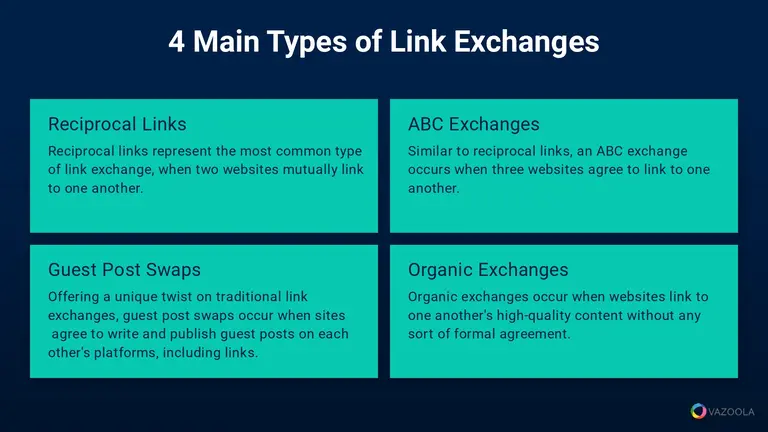
Reciprocal Links
In the world of the link exchange, reciprocal links between two websites represent the most straightforward approach. Website A links to Website B, and in turn, Website B links back to Website A.
While the simplicity of the reciprocal link method may seem appealing, be cautious. A balanced number of such incoming links can add SEO value, but an overreliance might raise red flags for search engines.
ABC Exchanges
A slightly more complex variation involves not two but three separate web pages. In this ABC Exchange, Website A links to Website B, Website B links to Website C, and Website C closes the loop by linking back to Website A.
The triangular model can mask the appearance of a straightforward link swap, adding a layer of subtlety to the exchange. However, if poorly executed, such a strategy could also appear manipulative to search engines.
Guest Post Swaps
Under the umbrella of link exchange for SEO, guest post swaps offer a unique twist. Here, website owner A and website owner B agree to write and publish guest posts on each other's platforms.
Such guest posts include backlinks to well established sites, effectively sharing valuable content and audiences between the sites. This type of link exchange not only helps in gaining inbound links to related sites, but also contributes to audience expansion and content diversification.
Organic Exchanges
Organic link exchange represents the most natural form of link swapping. In these instances, there's no formal agreement or pre-set arrangement.
Instead, Website A finds value in Website B's content and decides to link to it. Website B, recognizing the quality or relevance of Website A's content, reciprocates. Exchanging natural links often signifies a high level of mutual respect and offer the benefit of appearing especially authentic to search engines.
If you're in search of a safe, reliable way to garner a reciprocal link, focus on organically linking to desired partner pages exclusively. Ahrefs found that 19.25% of the domains it links to also link back to it.
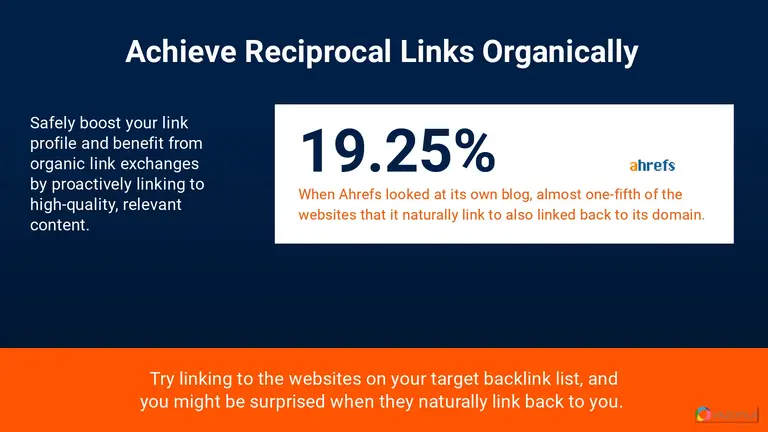
Are Link Exchanges Safe for SEO?
A common misconception often circulates that performing a link exchange automatically lands you on Google's naughty list. However, the reality is far more nuanced.
Google itself does not categorically penalize link exchange; rather, it provides specific guidelines designed to maintain the quality and integrity of these exchanges.
While Google's webmaster guidelines recognize that the exchange of links occurs naturally in the digital environment, the search giant emphasizes the importance of these links adding genuine value for users.
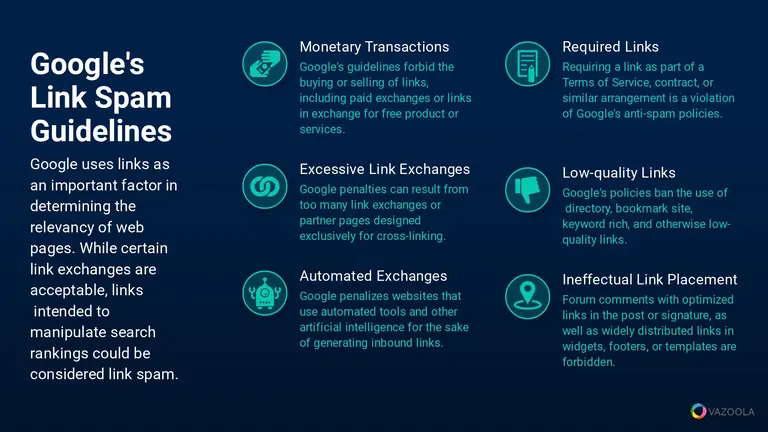
Google's concern is not the practice of link exchange itself, but the quality and relevance of the links involved.
Abusing the system with black-hat link schemes, low-quality links or spammy practices will likely trigger Google's algorithms and result in penalties. However, judicious, quality-focused link exchange in SEO is generally considered safe.
Engaging in too many backlinks exchange, even among high-quality, relevant domains, is not without risk. Google doesn't penalize every link exchange, but it does penalize excessive link exchange for SEO, deeming them an improper link scheme.
Of course, as with many of Google's guidelines, what exactly qualifies as excessive link exchanges remains both subjective and elusive.
As always, the key is not just to engage in exchanging backlinks on partner pages, but to do so wisely and ethically. Do take into account both Google's webmaster guidelines and the ultimate benefit to your website's visitors.
That being said, many successful websites agree they have benefited from the strategic use of reciprocating and exchanging backlinks. When evaluating 140,000 websites that receive at least 10,000 monthly visitors, Ahrefs found almost 74% feature reciprocal links.
As demonstrated below, exchanging links is more common than you might realize.
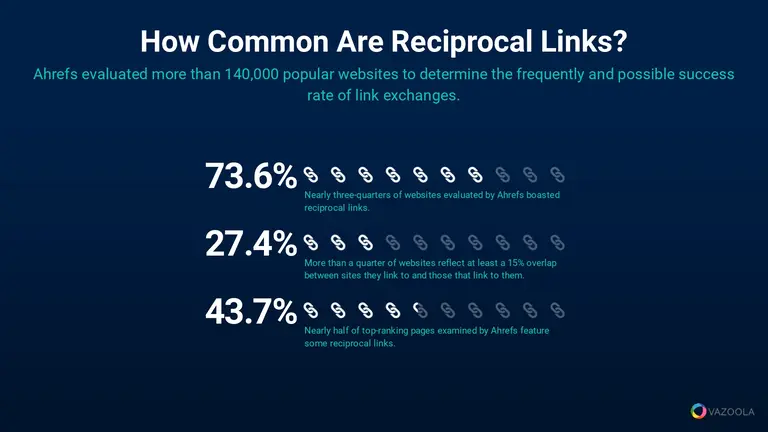
When Are Link Swaps Bad for SEO?
Although reciprocal links seo can offer certain advantages as a strategy, it is not without pitfalls.
Improper or excessive link exchanges can yield negative consequences for your website's search engine performance and credibility.
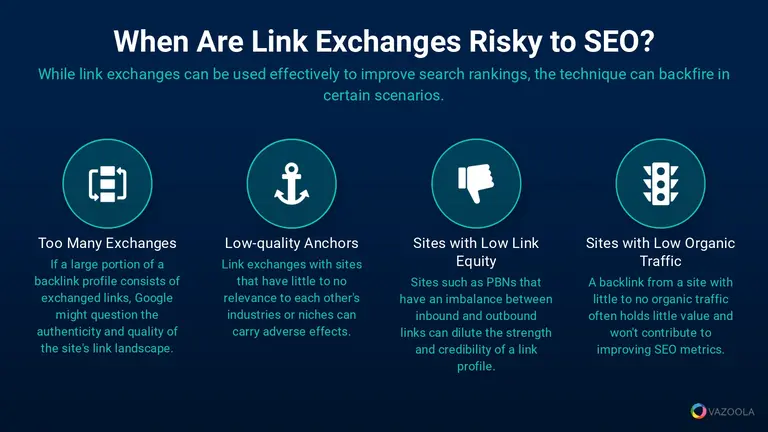
Therefore, it's crucial to recognize the instances when engaging in a misguided link scheme may become detrimental to your digital presence, including:
-
Too Many Exchanges in Backlink Profile: Relying too heavily on exclusively could raise eyebrows at Google. If a large portion of your profile consists of exchanged links, Google might start to question the authenticity and quality of your site's link landscape.
-
Low Quality or Irrelevant Anchors: Engaging with sites that have little to no relevance to your industry or niche is a risky maneuver. Moreover, if those links come with spammy anchor text, the adverse effects on your site’s credibility could be significant.
-
Sites with Low Link Equity: A cautionary tale in link swapping often involves websites with poor link equity. These are sites with an imbalance between how many outbound links they have compared to inbound links. Platforms with such an off-kilter inbound and outbound links ratio are often associated with Private Blog Networks or link farms, both of which can dilute the strength and credibility of the link profile of your own website.
-
Sites with No Organic Traffic: A link from a site lacking organic traffic is akin to a hollow endorsement. It might appear on the surface as a quality backlink, but without any real traffic behind it, it holds little link juice and won't contribute to improving your site's SEO metrics.
Understanding these potential pitfalls allows you to approach link exchanging with a more critical eye.
By remaining cautious and adhering to best practices, you can avoid these common traps and ensure that your link exchange activities contribute positively to your broader SEO strategy.
Pro Tips:
An abrupt spike in the number of backlinks could trigger Google’s spam filters. We recommend maintaining a consistent "link velocity," which refers to the speed at which you acquire backlinks. This approach offers a more organic backlink profile, reducing the risk of penalties.
When Is Exchanging Backlinks Good? How Do You Exchange Links Safely?
The narrative surrounding link exchanging often leans toward caution, but it's essential to remember that not all links exchanged spell trouble.
When executed with thoughtfulness and precision, link exchanges can serve as a valuable component in a well-rounded SEO strategy.
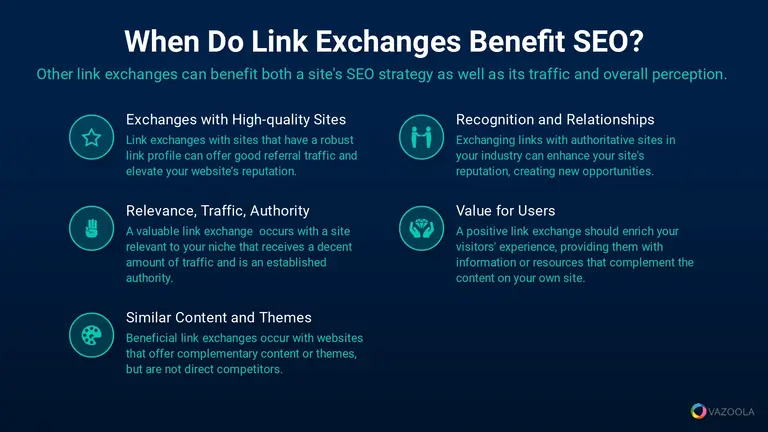
A few common circumstances when link exchanging actually can be beneficial include:
-
Exchanging Links with High-Quality Sites: Engaging in link exchanges with quality sites that have a robust profile and can offer good referral traffic can elevate your website’s reputation. Such partnerships often prove mutually beneficial, extending the reach and credibility of both parties involved.
-
Relevance, Traffic, Authority: When the site you're exchanging links with checks these three boxes—relevance to your niche, a decent amount of traffic, and established authority—you're likely on the right track. These attributes contribute to a meaningful and valuable link exchange that can positively impact your SEO metrics.
-
Similar Content and Themes: Consider link swaps with relevant websites that offer complementary content or themes, but that are not direct competitors. This strategy can bolster your site's niche authority and provide additional valuable resources to your audience.
-
Improved Recognition and Relationships: A well-executed link exchange can do more than just enhance SEO value; it can also pave the way for future collaborations. Exchanging links with authoritative sites in your industry can enhance your reputation and open doors to new opportunities.
-
Provided Value to Users: At the core of any successful link exchange is the fundamental principle of adding value to the user experience. Any link you add should enrich your visitors' experience, providing them with additional information or resources that complement the content on your own site.
Building links for a NEW website?
— Nick Zviadadze 🇺🇦 (@Nick_zv_) July 31, 2023
Do this to build links for cheap:
1. Answer 5-10 Terkel prompts per day
2. Answer 1-3 HARO prompts every day
3. Make friends with 3-5 bloggers a week (in your niche)
4. Build 3-4 reciprocal links a week
Exchanging backlinks under these favorable conditions allows you to harness the positive aspects of this practice while mitigating the risks.
As you integrate link exchanges into your broader SEO and content strategy, keeping these key factors in mind will guide you toward more fruitful and less risky collaborations.
Pro Tips:

Regularly examine the backlink profiles of your top competitors. Tools like Ahrefs or Moz can provide valuable data on where their links are coming from. This valuable information also can help you identify potential link exchange partners within your industry or niche.
How to Get Reciprocal Links
The process of obtaining a reciprocal link is far from a random endeavor. Instead, it demands a meticulous approach guided by a well-thought-out strategy.
We've identified key methods to help you get reciprocal links without compromising the integrity of your site's SEO profile. Each of these tactics deserves careful consideration.
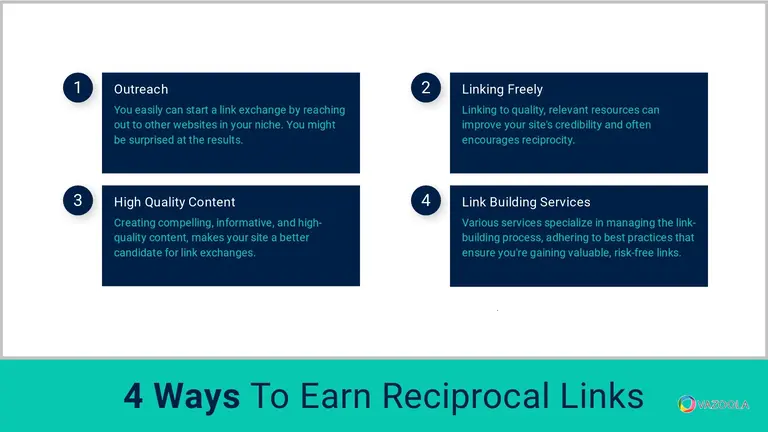
Outreach
One of the most straightforward ways to start a link exchange is by reaching out to other websites involved in your niche.
Whether it's through a friendly email or a more formal proposal, taking the initiative to connect can yield unexpected benefits.
For example, suppose you operate a travel blog. In that case, you might reach out to travel gear companies or even other members of the travel blogging community whose content aligns with your own. Blogger outreach services help you to find the right blogs to target, and can even handle the outreach for you.
Be sure to highlight what's in it for them: maybe your website caters to an audience that could be highly beneficial for their brand.
The key is to make your outreach as personalized and relevant as possible to set the stage for a mutually beneficial relationship.
If you've exhausted your list of targeted websites, consider browsing a private influencer network and reaching out to subject matter experts who might be interested in your quality content. Private influencer networks are communities of content creators who help promote each other and boost each other's efforts.
Pro Tips:

If your business has a local component, don't overlook the potential of exchanging local links. Partnering with local businesses or news outlets can not only build strong links but also draw more local traffic to your site.
Linking Freely
Many website operators hesitate to link out, fearing it might diminish their own site’s SEO value.
In reality, linking to other quality, relevant resources can improve your site's credibility and user experience. Such an action often encourages reciprocity.
A blog post that features data or insights from another site, accompanied by a link, might encourage that site to return the favor.
This type of organic, goodwill-based link exchange can lead to longer-term partnerships that benefit both parties.
Pro Tips:

Joint webinars, co-authored e-books, Facebook groups or other collaborative social media campaigns can serve as a springboard for exchanging backlinks. These co-marketing initiatives can extend your reach, attracting a broader audience and potential backlinks.
High-Quality Content
In the realm of SEO, the adage "content is king" holds true.
By creating compelling, informative, and high-quality content, you make your site a more attractive candidate for link reciprocation.
If your articles or resources are top-notch, other sites will naturally want to link to you.
For instance, an in-depth guide on digital marketing trends might attract backlinks from marketing agencies, industry forums, or educational platforms.
High-quality content attracts high-quality links; it's as simple as that.
Link-Building Services
For those who prefer to focus on other aspects of website management, outsourcing link-building activities is a viable option.
Several reputable link building services specialize in managing the process, adhering to best practices to ensure you're gaining valuable, risk-free links.
However, convenience comes at a cost, so weigh the potential ROI against the fees charged by these services. It's crucial to vet these services carefully to ensure they align with your brand's ethos and SEO strategy.
Strategies for Link Exchange SEO Success
Navigating the intricacies of link exchanges often can feel like a high-stakes game. However, armed with the right knowledge and approaches, you can turn it into a rewarding venture.
Over the years, we at Vazoola have closely observed the ups and downs of link exchange trends, and we're here to share some advanced strategies that have proven effective for numerous professionals in the SEO services space.
These tips move beyond the basics, offering you nuanced methods to refine your link exchange strategy for better results.
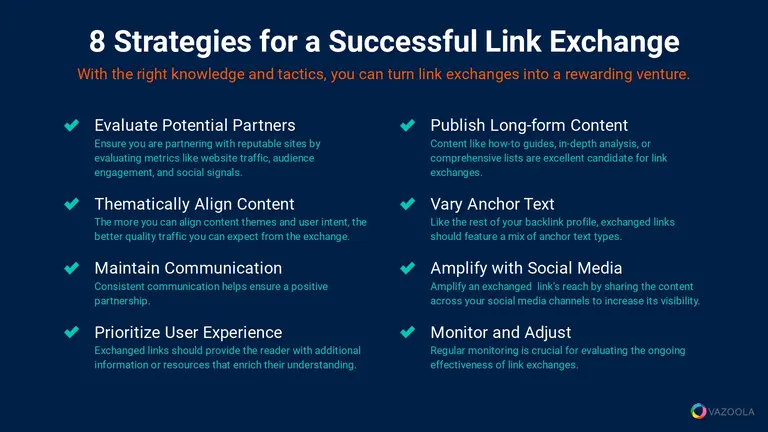
Evaluate Your Prospective Partner’s Trustworthiness
Don't rush when it comes to choosing a partner for a link exchange.
Apart from the obvious metrics like the site's ranking in search and its domain rating, consider scrutinizing other markers such as website traffic, audience engagement, social signals, and even existing link popularity.
The aim is to ensure that the site you are partnering with not only boasts high search rankings but also is reputable and engaging to its audience.
The comprehensive evaluation process can help you avoid potential red flags like high spam scores or low-quality content.
Align Content Thematically
It's one thing to exchange links with a site in the same niche; it's another to ensure that the specific content being linked is deeply relevant to the users of both sites.
For instance, if you're a health and wellness website, a link exchange with a recipe blog could be more meaningful if the specific articles being linked pertain to healthy eating or nutrition.
The more you can align content themes and user intent, the better the quality of traffic you can expect from the exchange.
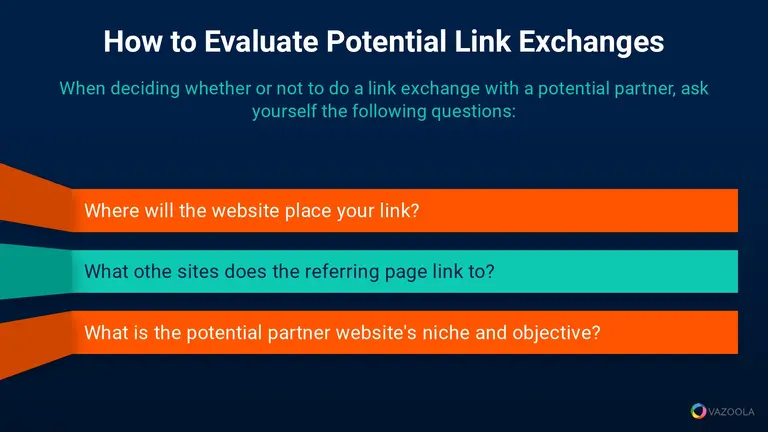
Maintain Open and Transparent Communication
As in any business relationship, openness can make or break your link exchange partnerships, particularly when it comes to your link exchange requests.
When you exchange links, set clear expectations right from the start: Discuss where the link will be placed, the type of anchor text to be used, and whether the link will be "dofollow" or "nofollow."
Consistent communication doesn't just avoid misunderstandings but also can open doors for future collaborations.
Prioritize User Experience Over All Else
Links should always serve a purpose for the reader, providing additional information or resources that enrich their understanding of the content or web page.
If a link feels forced or irrelevant, it can alienate your audience and send negative signals to search engines.
Always prioritize delivering an exceptional user experience over any potential SEO gains.
Opt for Long-Form Content to Encourage Inclusion
Long-form content offers a fertile ground for incorporating outbound links without making them seem forced.
Pieces like how-to guides, in-depth analysis, or comprehensive lists naturally require external references, making them excellent candidates for exchanging outbound links.
Long-form content likewise is more likely to be shared and cited, thereby increasing the value of your reciprocal link over time.
Vary Your Anchor Text to Boost Backlink Profile
It may seem intuitive to use keyword-rich anchor text, but even with related keywords. However, if overused, this practice can signal to search engines that the site manipulates links.
A well-balanced backlink profile features a mix of anchor text types—branded anchor texts, generic phrases, and even full URLs. Link exchanges are no exception.
Such diversity sends positive signals to search engines and contributes to a more organic link structure.
Use Social Media to Amplify Exchanged Links
Once the link exchange is established, don't just leave it to perform on its own.
Amplify its reach by sharing the content across your social media channels.
This is a win-win for both parties involved in the exchange. Not only does this practice increase the visibility of the link, but it also serves as an endorsement, enhancing trust and engagement.
Monitor and Adjust Your Strategy
A link exchange is not a "set it and forget it" type of endeavor.
Regular monitoring is crucial for evaluating the ongoing effectiveness of your exchanges.
Utilize tools that track key performance indicators like organic traffic, backlink quality, and conversion rates.
If certain links are underperforming, don't hesitate to revisit the terms of the exchange or even to terminate it.
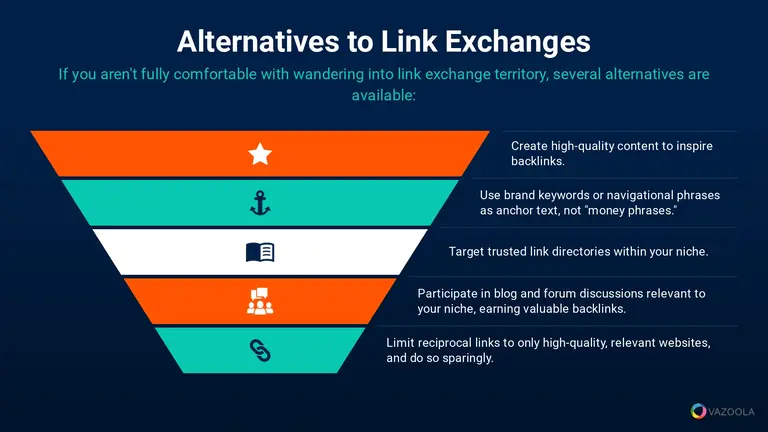
Through the application of these advanced strategies, we believe that link exchanging can be transformed from a simple tactical maneuver into a rich, rewarding strategy that opens up avenues not only for backlink building but also for sustainable relationships and collaboration, enriching your brand and augmenting your reach in the digital space.
We at Vazoola have seen that link exchanges come with their own set of benefits and risks.
While not a strategy we specifically endorse, we acknowledge the potential utility of reciprocal link building when applied wisely. Even Google offers guidance on the subject, a nod to its role in the digital ecosystem.
The key to successfully integrating link exchanges into your SEO strategy lies in their judicious and strategic application.

